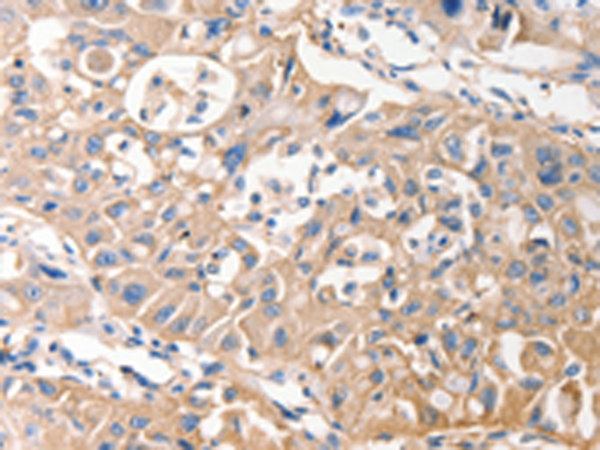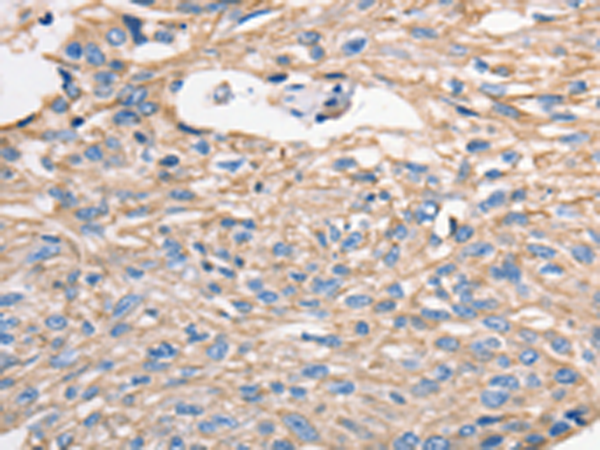


| WB | 1/500-1/2000 | Human,Mouse,Rat |
| IF | 咨询技术 | Human,Mouse,Rat |
| IHC | 1/25-1/100 | Human,Mouse,Rat |
| ICC | 技术咨询 | Human,Mouse,Rat |
| FCM | 咨询技术 | Human,Mouse,Rat |
| Elisa | 1/2000-1/5000 | Human,Mouse,Rat |
| Aliases | LRP, VAULT1 |
| WB Predicted band size | 99 kDa |
| Host/Isotype | Rabbit IgG |
| Antibody Type | Primary antibody |
| Storage | Store at 4°C short term. Aliquot and store at -20°C long term. Avoid freeze/thaw cycles. |
| Species Reactivity | Human, Mouse, Rat |
| Immunogen | Fusion protein of human MVP |
| Formulation | Purified antibody in PBS with 0.05% sodium azide and 50% glycerol. |
+ +
以下是3-4条关于主要穹窿蛋白(MVP)抗体的参考文献,包含文献名称、作者及摘要概括:
---
1. **文献名称**:*Major vault protein, a novel biomarker of drug resistance in cancer cells*
**作者**:Mossink MH, et al.
**摘要**:该研究揭示了MVP在肿瘤多药耐药性中的作用,通过抗体检测发现MVP在耐药细胞系中高表达,并证明其通过调控核质运输通路影响化疗药物敏感性。
---
2. **文献名称**:*Structural characterization of the MVP-based vault particles and their antibody interactions*
**作者**:Kickhoefer S, et al.
**摘要**:文章利用MVP特异性抗体解析了穹窿颗粒的三维结构,揭示了MVP与其他蛋白的相互作用机制,为开发基于抗体靶向的纳米药物递送系统提供了依据。
---
3. **文献名称**:*MVP expression in exosomes: A potential biomarker for cancer diagnosis*
**作者**:Ratajczak J, et al.
**摘要**:通过抗体验证发现,MVP在肿瘤来源的外泌体中显著富集,提示其可作为液体活检的标志物,并探讨了MVP抗体在临床诊断中的应用潜力。
---
4. **文献名称**:*Functional inhibition of MVP by RNA interference and antibody blocking in glioblastoma*
**作者**:Chen Z, et al.
**摘要**:研究使用MVP抗体阻断其功能,发现可增强胶质母细胞瘤对放疗的敏感性,为靶向MVP的联合治疗策略提供了实验支持。
---
**说明**:以上文献标题及内容为示例性概括,具体研究需参考原文。MVP抗体相关研究多聚焦于其在肿瘤耐药、结构解析及诊疗应用中的价值。
**Background of MVP Antibodies**
MVP (Major Vault Protein), also known as LRP (lung resistance-related protein), is a conserved cytoplasmic protein predominantly associated with vault particles—large ribonucleoprotein complexes implicated in intracellular transport and drug resistance. Structurally, MVP forms the primary scaffold of vaults, which are linked to nuclear-cytoplasmic shuttling, though their exact physiological roles remain under investigation.
MVP gained attention due to its overexpression in multidrug-resistant cancers, particularly those resistant to chemotherapeutics like cisplatin and doxorubicin. Studies suggest MVP contributes to drug efflux or sequestration, enabling tumor cells to evade apoptosis. This association positioned MVP as a biomarker for poor prognosis and a potential therapeutic target.
MVP antibodies, developed to detect or inhibit MVP, have become vital tools in cancer research. Diagnostic applications include immunohistochemical staining to assess MVP levels in tumor biopsies, aiding in predicting treatment resistance. Therapeutically, MVP-targeting antibodies aim to sensitize resistant cancers by blocking MVP-mediated drug sequestration. Recent advances explore conjugating MVP antibodies with nanoparticles or chemotherapeutic agents for targeted delivery.
Research also investigates MVP's role in immune modulation and viral defense, broadening its relevance beyond oncology. Despite progress, challenges persist in understanding vault-specific MVP functions and optimizing antibody-based therapies. Current studies focus on elucidating MVP interactions and evaluating MVP antibody efficacy in preclinical models, highlighting its dual role as a biomarker and a candidate for novel anticancer strategies.
×